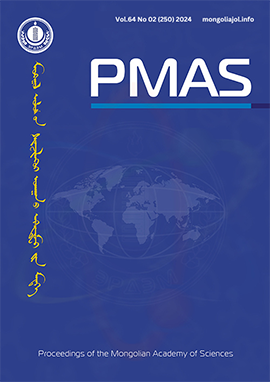Current status of the Food Security system in Mongolia new policies, and expected outcomes
DOI:
https://doi.org/10.5564/pmas.v64i02.3652Keywords:
food security strategy, its implementation, security systems, organizational structure, administrative and professional functionsAbstract
The national food security system in our country is not established well and continues to remain weak. Failures within the system have caused malfunctions and distortions in government policy implementation, leading to unexpected policy shifts. These faults are the main causes of time loss, inter-agency misunderstandings, lack of coordination, information flow deficiencies, and a shortage of skilled human resources. These issues can have a negative impact on food security in Mongolia, resulting in the shortfall of government policy implementation. Coordination of food security activities among government organizations in Mongolia has been unsatisfactory due to the weak system. Government services have not adequately reached organizations at the middle and primary levels in the Mongolian rural provinces. This research paper aims to evaluate the national food security situation based on policies in Mongolia's food sector over the past decade, their implementation, encountered problems, and involved stakeholders. The research findings show that our country's food security system is not well-established, leading to compromised food security, highlighting the urgent need for developing necessary legal and policy documents to effectively implement state food security policy.
Downloads
1414
References
Damdinsuren, L. Fundamentals of Food Security. pp. 22-28,. Ulaanbaatar. 2015.
Deleg, S. Food Product Cooling Technology. pp. 8-9. Ulaanbaatar. 2013.
Key Nutrition Concerns among the Population of Mongolia. Fifth National Survey Report. pp.10-13, Ulaanbaatar. 2017.
Bever, M. Governance, pp. 15-22, Ulaanbaatar. 2018.
Introduction to the 2022 Implementation Monitoring and Evaluation of the "Action Program of the Government of Mongolia for 2020-2024". pp. 7-8, Ulaanbaatar. 2023
Household Socio-economic Survey). National Statistical Office of Mongolia, Ulaanbaatar. 2019, 2021.
Food security statistical data news, pp. 11-16, National Statistical Office of Mongolia, Ulaanbaatar, 2019-2022.
Byambasuren, Y., Dorjsuren, P., & Tserenchimed, O. State Policy, pp. 125-136, Ulaanbaatar.2021.
Tsanjid, A. Policy research, pp. 28-29. 2023.https://doi.org/10.12968/cypn.2023.4.28
The report for the assessment of Food safety law implementation, pp. 20-24, Ulaanbaatar. 2020.
Simelane, K. S., & Worth, S. Food and Nutrition Security Theory. Food and Nutrition Bulletin, 4(3), pp. 367-379. 2020. https://doi.org/10.1177/0379572120925341
Anderson, M. (1999). Community Food Security: Practice in Need of Theory? Agriculture and Human Values, June 1999. https://doi.org/10.1023/A:1007580809588
Peng, W., & Berry, E. M. (Year not provided). The Concept of Food Security. Encyclopedia of Food Security and Sustainability, vol 2, pp. 1-7. Elsevier. https://doi.org/10.1016/B978-0-08-100596-5.22314-7
Subramaniam, M., & Bunka, C. (Year not provided). Food Security, and State: Policy Considerations for the Contemporary Food Crisis. Policy Brief №7, Purdue University, Global Policy Research Institute.
"The Concept of the National Security of Mongolia." Parliament Resolution № 48 of 2010, State Information, № 36/657, pp.39-40, Ulaanbaatar. 2010.
Climate Change and Nutrition in Mongolia: Risk Outlook. pp. 7-8, FAO, UNDP. 2023.
Order of Minister of Health of Mongolia, pp. 3-4, A/74, 2017.
Boweird, T., & Loeffler, E. (2014). Public Sector Management and Governance.https://doi.org/10.4324/9781315693279
Hunger map. https://hungermap.wfp.org/
Downloads
Published
How to Cite
Issue
Section
License
Copyright (c) 2024 Enkhmaa Deleg, Sugar Nergui, Tuyatsetseg Jambal, Enkhtaivan Batbold, Amarjargal Avidsuren

This work is licensed under a Creative Commons Attribution 4.0 International License.
Copyright on any research article in the Proceedings of the Mongolian Academy of Sciences is retained by the author(s).
The authors grant the Proceedings of the Mongolian Academy of Sciences a license to publish the article and identify itself as the original publisher.

Articles in the Proceedings of the Mongolian Academy of Sciences are Open Access articles published under a Creative Commons Attribution 4.0 International License CC BY.
This license permits use, distribution and reproduction in any medium, provided the original work is properly cited.

